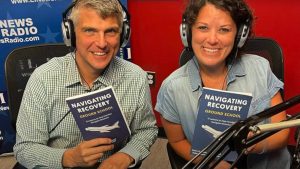
Addiction is a family illness, but what does that mean?
Families who request intervention services know that their loved one’s addiction is affecting them, often profoundly. But they don’t yet understand how their own behavior is adding to their pain.
By the time a family has a conversation with us, they’ve likely spent many months or years trying to manage their loved one’s addiction. The person with Substance Use Disorder may have asked his partner to “cover for him” when his boss raises questions about why he isn’t coming to work.
What is Emotional Detachment?
Detachment is the freedom and the responsibility to choose how you interact with the disease of addiction.
Another person of concern may have borrowed money from her parents to pay her rent, while spending her own paycheck on drugs. Families may be drawn into making up lies, providing their loved one with financial support, or covering up relationship transgressions. These are not healthy efforts to protect their loved one from the consequences of their addiction.
Stepping back, or detaching, (as Al-Anon puts it) is sometimes the only means through which families can begin to heal the emotional damage caused by addiction. During interventions we teach families how to master the skill of detachment. It is one of the keys to their recovery.
The different types of detachment
The Al-Anon literature on detachment reads, “Separating ourselves from the adverse effects of another person’s alcoholism…does not necessarily require physical separation. Detachment can help us look at our situations realistically and objectively.” According to Al-Anon, detachment “does not imply judgement or condemnation of the person or situation from which we are detaching.” It is a survival mechanism and buffer from the emotional pain that accompanies the outcomes of addiction.
Practicing detachment can be tricky. Withdrawing unhealthy support can feel like withdrawing love. Families that are skilled at detachment identify and stop behaviors that co-sign their family member’s addiction. They embrace behaviors that point their loved ones towards recovery.
Financial detachment
In some circumstances, families attempt to financially protect their family member from the consequences of an addiction. During an intervention we help families take a critical look at the flow of money around the addiction. Are family members paying for the loved one’s car, insurance, school, rent, or cell phone? If their loved one is using money from their job to buy drugs while their family pays for some of their other expenses, the family is supporting the addiction and not recovery.
Families may financially detach from their loved ones by withholding money for their cellphone plan or school. For many parents this is far easier said than done, since detachment in this case may limit their ability to contact their child or lead their child to drop out of college. It may also mean that the sick family member is one step closer to treatment, as the consequences of the addiction close in on them.
Emotional detachment
Families may hover over the person with Substance Use Disorder. Or they may try to cut off the person, refusing as much as possible to have anything to do with them. Either way, families worry about their loved one’s health and safety, and feel shocked or frustrated or angry about their behavior. They experience ongoing grief over the absence of the person they once knew and loved, before drugs or alcohol took over.
We help families to recognize the point where addiction is determining their own emotional state. Do they only feel good when their loved one is apparently doing OK? Are they always in a crisis when the person of concern is in a crisis? Are they riding the addiction roller coaster of emotions?
While we assure families that it is okay to love someone with Substance Use Disorder, we encourage them to “step away” from the the cycles of addiction. With intervention, families work to free themselves from the perpetual crisis dictated by the loved one’s latest drug or alcohol binge. Detachment helps families heal the emotional wounds that happened while they were trying to support their sick loved one.
Detachment and communication
In a comprehensive intervention we begin to identify patterns of communication within the family that promote addiction. Active addiction always tries to “peel off” loved ones and keep them separated. Once separated, some family members know part of the story while others have a different narrative. There may be arguments about “How bad is this, really?” These situations create distractions from the reality that everyone is facing. Family members are sucked into minimizing, telling lies, or “covering up” for the person with Substance Use Disorder. I teach emotional detachment so families achieve a greater level of honesty and clear communication.
Healthy detachment takes lots of practice
Many families struggle to understand the wisdom of detachment. As they learn to detach, their new behaviors help them support the recovery of their loved one, while minimizing further damage to themselves. We believe that intervention must involve the family, and that treating the family begins with empathy. We embrace everyone suffering from Substance Use Disorder with concern, compassion, and accountability. This includes the person of concern, their partners, parents, grandparents, siblings, and children. Family recovery can begin immediately, and often creates benefits even before the person of concern is willing to enter recovery.
About Adam Banks
Adam Banks is a certified interventionist and the owner of Adam Banks Recovery. After receiving an MBA from the University of Chicago, Adam built a company that was later acquired by United Health Care. His discipline and attention to detail comes from his former career as an airline pilot, holding an ATP, the FAA’s highest license.
Today, Adam is dedicated to helping others achieve long-term sobriety. His work has guided executives, pilots, and physicians on paths to recovery. Adam brings families together through a loving and inclusive approach.
Adam has authored four books on addiction. His recent work, Navigating Recovery Ground School: 12 Lessons to Help Families Navigate Recovery, educates families on the entire intervention process. He also offers a free video course for families considering an intervention for a loved one.
Adam is available for alcohol and drug intervention services in New York, Long Island, the Hamptons as well as nationally and internationally.




